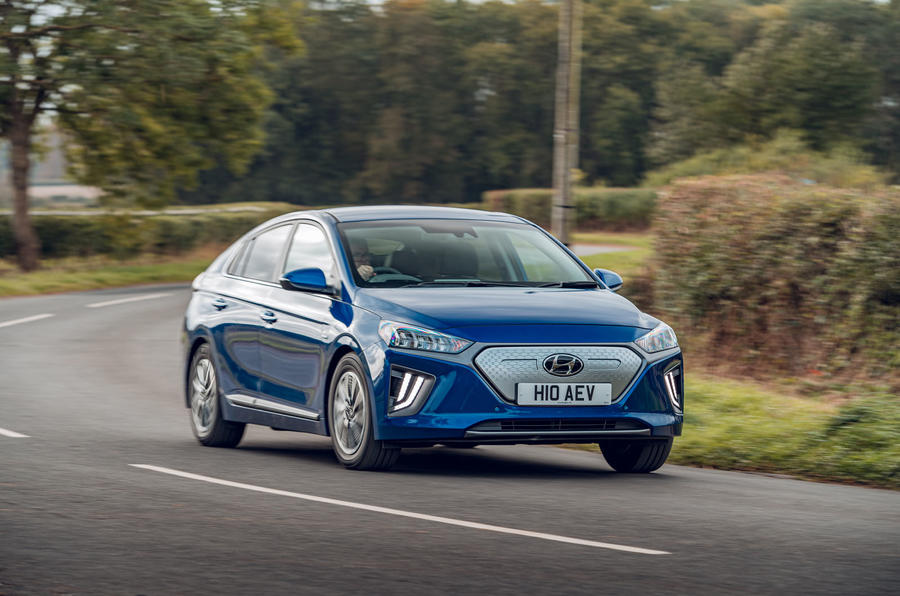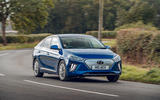What is it?
The Hyundai Ioniq goes one further than its Toyota Prius rival in offering a fully electric version alongside hybrid and plug-in hybrid versions. This revised Ioniq Electric brings with it a larger battery (up from 28kWh to 38kWh) and a more efficient electric motor to increase the range by some 30% to a claimed 194 miles.
There are a host of other tweaks, too, mostly designed to improve efficiency and contribute to that increased range. Most noticeable is that new front grille design - big, bright, silver - with active air flaps to aid cooling.
When that 194-mile range is depleted, the revised Ioniq Electric is faster to charge than before thanks to an upgraded charging system. The 7.2kW on-board charger can replenish the car's reserves to 80% from a 50kW charge point in 57 minutes and go from flat to full in just over six hours from a 7kW charger.
Also notable is the revised interior, where the main change is a 10.25in touchscreen that now protrudes from the centre console rather than sitting within it. New features have been added alongside a slicker operating system and it’s complemented by upgraded switchgear below it that’s now backlit.
What's it like?
On first acquaintance after a full charge on a cold day, our Ioniq showed 171 miles of range and that proved to be a true figure and more than enough for the commuter driving and routes the Ioniq is best suited to.
Performance is brisk but not unruly in the way Hyundai’s other electric car, the Kona Electric, is. Although the two share a 291lb ft torque output, the Kona gets more power (201bhp plays 134bhp here). However, the Ioniq’s power delivery is much better judged and the car is much more driveable across all speeds. It’s sharp off the line, which makes it great for nipping in and out of city traffic, and settles into a much smoother drive at speed, but it is not sledgehammer in its delivery in the way that the Kona Electric is, a car that needs little interaction with the throttle pedal to spin its wheels.
The Ioniq Electric forgoes the multi-link rear suspension of the Ioniq hybrids in favour of a torsion beam to accommodate the lithium ion battery pack. As a result, it’s not the most sophisticated car in the way it rides, being fine over smooth roads but crashy at lower speeds. That lack of sophistication also extends to the handling: there’s no dynamic sparkle here, with predictability the order of the day.
Everything about the Ioniq Electric seems done in the pursuit of efficiency. That brings good and bad: it’s great fun eking out extra range by cycling through the steering wheel paddles to increase or decrease the amount of regenerative braking, but the low-rolling-resistance tyres create a significant amount of roar at speeds to deny the Ioniq Electric the quiet, calm driving environment typical of its rivals.
You’ll have to turn the radio up to drown it out and that radio is part of an upgraded infotainment system that's slick to operate and feature rich. Its modernity does jar slightly with the rather drab interior elsewhere, which majors on lots of dark plastics.
Should I buy one?
'Functional' is perhaps the best word to describe the Ioniq Electric overall. It’s competent in all areas, while being neither outstanding nor sub-standard anywhere, too. It’s likeable for feeling so dependable, yet rivals shine brighter in other areas - including Hyundai’s own Kona Electric.



























































Join the debate
Add your comment
Hyundai Ioniq Electric
Thanks for sharing this post with us. It's really an amazing post. You have done a really excellent job Keep posting the good work in the future too.
Serves a purpose
When city centres start kicking us out of our Euro 5 petrols and diesels, we will catch a cab (one of these) to enjoy a night out....!
Hire car companies could find these appealing too.
Not a Tesla 3
So for approx £10k more you can have a base model Tesla 3 with slightly more range, better looks and accomodation, and faster charging.
I think Hyundai/Kia need to decide whether they are going to back hybrid or electric or hydrogen and make a best in class version of one of them. At the moment they seem to be falling in the middle.
Half the cost of a Tesla 3 to lease
In the real world this is the most affordable practical electric car at the moment. The lease prices are similar to the Golf Electric on run out, with a lot more range and kit. The Tesla 3 is nice, but loads more money.
Dull to the point of soporific....
True...but you are writing this on Autocar's website....not 'What Washing Machine Monthly'. It's still nearly £ 30K - purchase or PCP - and, more to the point, life-witheringly dull. You might as well use public transport: it's more life-affirming....
Bimfan wrote:
Hyundai sell the Kona EV. Kia sell the eNiro. They are both great cars when specced with 64kwh battery packs and definitely best in class for the current price. They are both built on the same platform as the petrol car, so I look forward to seeing what they can do with a dedicated EV platform. Possibly next year, maybe the year after.
Bimfan wrote:
Hyundai sell the Kona EV. Kia sell the eNiro. They are both great cars when specced with 64kwh battery packs and definitely best in class for the current price. They are both built on the same platform as the petrol car, so I look forward to seeing what they can do with a dedicated EV platform. Possibly next year, maybe the year after.